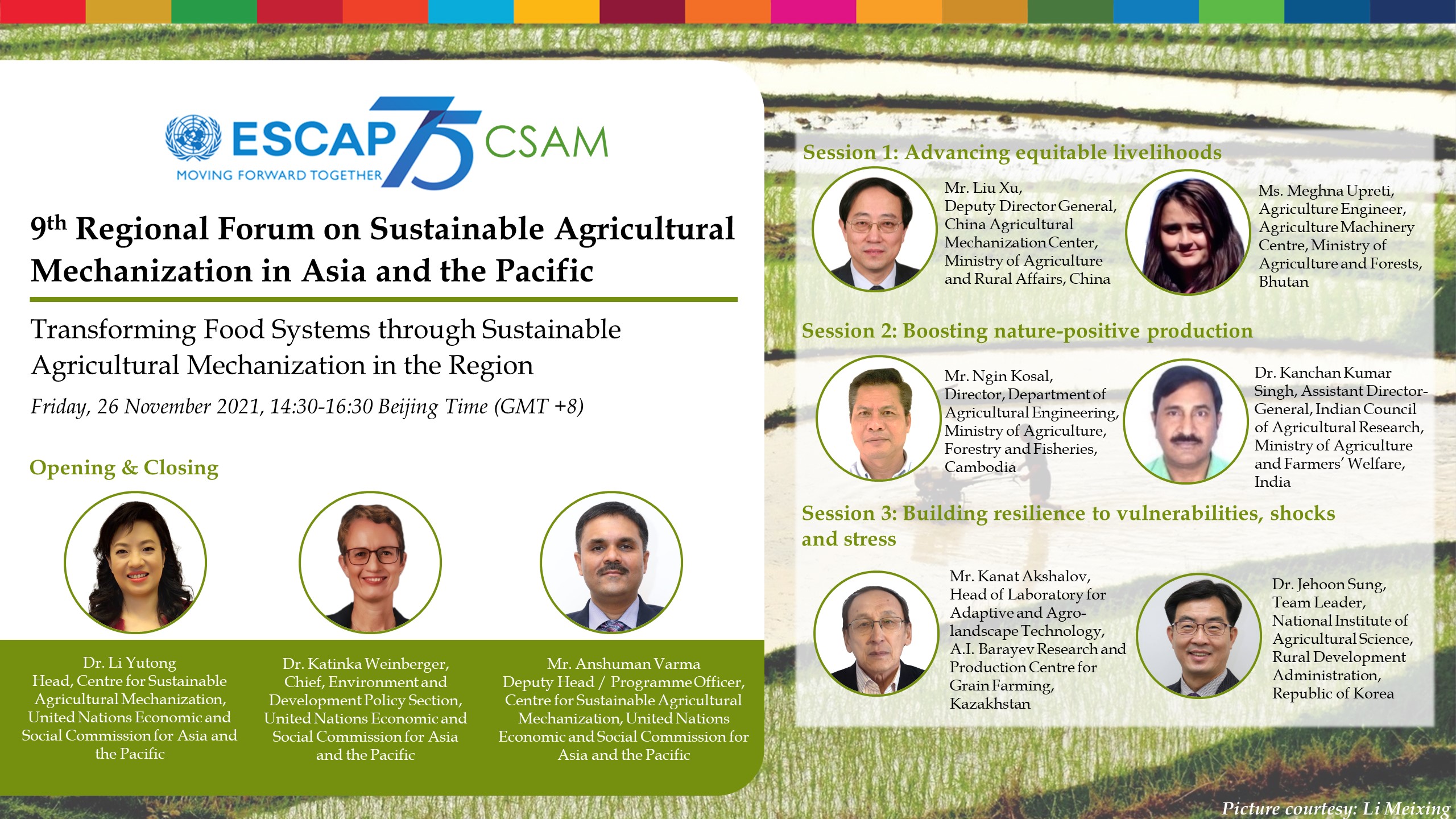CSAM commits to support stakeholders’ network for food systems transformation at 9th Regional Forum

Meeting Documents
Sustainable, inclusive and transformative food systems are needed to feed a growing global population while protecting our planet in the backdrop of the current complex challenges including impacts of the COVID-19 pandemic and climate change. The United Nations Food Systems Summit held in September 2021 defined bold new actions in transforming the world’s food systems to be more inclusive and sustainable and witnessed pledges from a diverse set of stakeholders.
Organized as one of the independent dialogues in follow-up to the Food Systems Summit, the ‘9th Regional Forum on Sustainable Agricultural Mechanization in Asia and Pacific’ was held virtually on 26 November 2021 to synthesize the experiences and insights of stakeholders on the theme of ‘Transforming Food Systems through Sustainable Agricultural Mechanization in the Region’. The Forum examined the key role of sustainable agricultural mechanization in transforming food systems, prioritized efforts among stakeholders, and enabled knowledge sharing and regional cooperation conducive to the goals of the Food Systems Summit.
The deliberations were structured around three out of the five action tracks of the Summit which are particularly relevant for sustainable agricultural mechanization, namely, 1) advancing equitable livelihoods; 2) boosting nature-positive production; and 3) building resilience to vulnerabilities, shocks and stress.
Mr. Xu Liu, Deputy Director General of China Agricultural Mechanization Center under the Ministry of Agriculture and Rural Affairs of China, presented the proven practices and successful experiences on how sustainable agricultural mechanization is supporting rural revitalization and poverty reduction in China. Ms. Meghna Upreti, Agriculture Engineer of the Agriculture Machinery Centre of the Ministry of Agriculture and Forests of Bhutan, elaborated on the situation of women farmers in Bhutan and proposed options for empowering them to benefit further from sustainable agricultural mechanization. The two speakers shed light on the role of sustainable agricultural mechanization on advancing equitable livelihoods.
Mr. Ngin Kosal, Director of the Department of Agricultural Engineering of the Ministry of Agriculture, Forestry and Fisheries of Cambodia, introduced the successes and challenges encountered while scaling up mechanization for conservation agriculture and outlined efforts to address the pertinent challenges. Dr. Kanchan Kumar Singh, Assistant Director-General of the Indian Council of Agricultural Research of the Ministry of Agriculture and Farmers’ Welfare of India, presented his government’s endeavors in addressing crop residue burning through mechanization-based solutions, including the tangible outcomes attained up to date. The examples in Cambodia and India revealed the role of mechanization in boosting nature-positive production.
The experience from Kazakhstan, as presented by Mr. Kanat Akshalov, Head of Laboratory for Adaptive and Agro-landscape Technology of the A.I. Barayev Research and Production Centre for Grain Farming, showed how the mechanized tillage system can be beneficial in coping with climate change in dryland conditions. Dr. Jehoon Sung, Team Leader of the National Institute of Agricultural Science of the Rural Development Administration of the Republic of Korea shared the practices and research progress in digital agriculture and its promising future in building resilience to vulnerabilities, shocks and stress.
The 9th Regional Forum was opened by Dr. Yutong Li, Head of the Centre for Sustainable Agricultural Mechanization of the United Nations Economic and Social Commission for Asia and the Pacific (ESCAP). Dr. Katinka Weinberger, Chief of the Environment and Development Policy Section of the Environment and Development Division of ESCAP also briefly presented an overview of the outcomes of the United Nations Food Systems Summit and the entry points for agricultural mechanization in the transformation of food systems.
As a notable result from the 9th Regional Forum, CSAM committed to support the network of stakeholders participating in the Regional Forum to promote sustainable agricultural mechanization for food systems transformation, including where relevant by contributing to the national pathways identified at the Food Systems Summit. This has been officially registered among the Summit’s ‘Commitments to Action’.
The event was attended by more than 100 participants from more than 20 countries in the region and beyond and relevant peer organizations via online channels.
